初一英语人教版(下)U2知识回顾
人教版七年级英语下册第二单元知识点总结
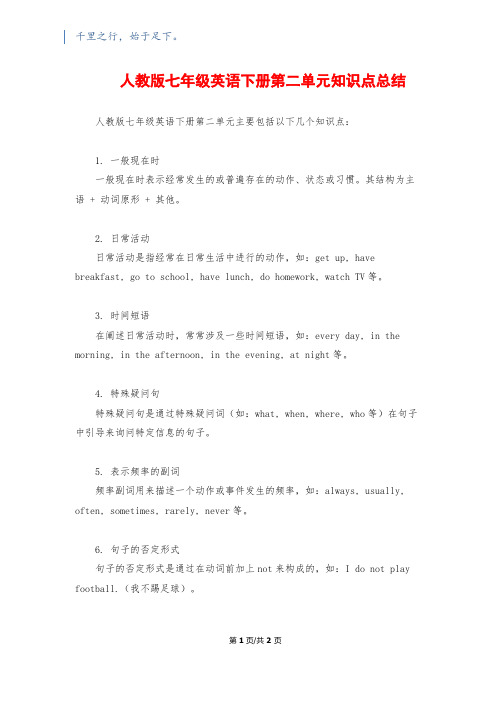
千里之行,始于足下。
人教版七年级英语下册第二单元知识点总结人教版七年级英语下册第二单元主要包括以下几个知识点:1. 一般现在时一般现在时表示经常发生的或普遍存在的动作、状态或习惯。
其结构为主语 + 动词原形 + 其他。
2. 日常活动日常活动是指经常在日常生活中进行的动作,如:get up, have breakfast, go to school, have lunch, do homework, watch TV等。
3. 时间短语在阐述日常活动时,常常涉及一些时间短语,如:every day, in the morning, in the afternoon, in the evening, at night等。
4. 特殊疑问句特殊疑问句是通过特殊疑问词(如:what, when, where, who等)在句子中引导来询问特定信息的句子。
5. 表示频率的副词频率副词用来描述一个动作或事件发生的频率,如:always, usually, often, sometimes, rarely, never等。
6. 句子的否定形式句子的否定形式是通过在动词前加上not来构成的,如:I do not play football.(我不踢足球)。
第1页/共2页锲而不舍,金石可镂。
7. 照片描写照片描写是通过描述照片中的人物、场景和动作来展示对照片的理解,如:There are three girls in the photo.(照片里有三个女孩)。
8. 人物介绍人物介绍是用来介绍他人的个人信息和特点的句子,如:This is my friend, Lily. She is tall and has long hair.(这是我的朋友莉莉。
她个子高,头发长)。
9. 情感表达情感表达是用来表达个人情感或态度的句子,如:I like playing basketball.(我喜欢打篮球)。
10. 文化背景在学习英语过程中,还可以了解一些与英语相关的文化背景知识,如:英语国家的民俗风情、历史文化等。
人教版七年级下册unit-2重点内容归纳

人教版七年级下册unit 2重点内容归纳【知识归纳】1、Either...or...either…or…主要用于表示选择,其意为“要么…要么…”“或者…或者…”,用于连接两个性质相同的词或短语.如:You can have either this one or that one.你拿这个或那个都可以.You must either go at once or wait till tomorrow.你要么马上走,要么等到明天.We can finish the work either this week or next week.不是这星期就是下星期我们就可完成这项工作.特别注意:either…or…连接两个成分作主语时,谓语动词的形式遵循“就近原则”.如:Either you or I am to go.你或我必须有人去.Either he or you are right.要么他对,要么你对.3、Exerciseexercise做锻炼时为不可数名词,如do exerciseexercise 做练习或操讲为可数名词,如do math exercises, do morning/eye exercises2、job/workjob就是指具体的一份工作,为是可数名词;work做动词时,常指工作状态如:What’s your job?I have a wonderful job,it’s so exciting.A:What are you doing right at this moment? B:I'm working!work作名词有两种意思:指“工作”时为不可数名词out of work表示失业;做可数名词时表示“著作”,如Lun Xun’s works4、Lots ofLots of = a lot of 既可以修饰可数名词又可以修饰不可数名词注意:a lot 不能修饰名词,常用来修饰形容词或动词,为副词词性5、频度副词频度副词按频度从高到底为Always–usually(generally)-often- sometimes- seldom- hardly- never 对频度副词提问常用how often6、Taste··taste 作动词时,有两种情况:·taste 后可跟名词或代词,意为“尝、品尝某物”。
最全面人教版七年级下册英语第二单元知识点归纳总结
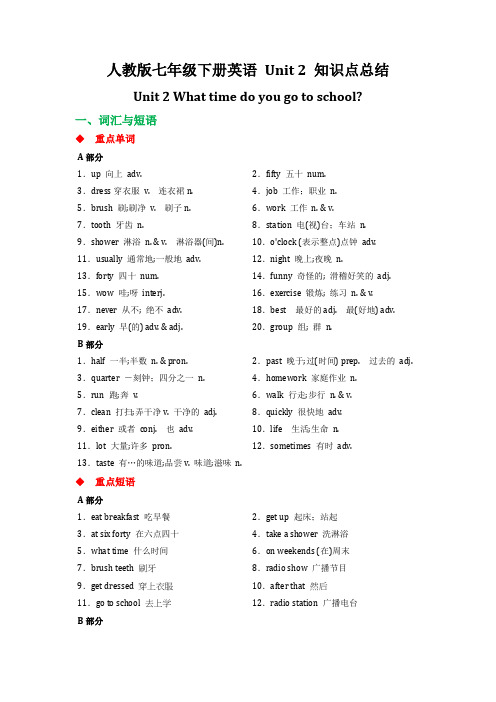
人教版七年级下册英语Unit 2 知识点总结Unit 2 What time do you go to school?一、词汇与短语◆重点单词A部分1.up 向上adv.2.fifty 五十num.3.dress穿衣服v. 连衣裙n.4.job 工作;职业n.5.brush 刷;刷净v. 刷子n.6.work 工作n. & v.7.tooth 牙齿n.8.station 电(视)台;车站n. 9.shower 淋浴n. & v. 淋浴器(间)n.10.o'clock (表示整点)点钟adv. 11.usually 通常地;一般地adv.12.night 晚上;夜晚n.13.forty 四十num.14.funny 奇怪的; 滑稽好笑的adj. 15.wow 哇;呀interj.16.exercise 锻炼; 练习n. & v. 17.never 从不; 绝不adv.18.best 最好的adj. 最(好地) adv. 19.early 早(的) adv. & adj.20.group 组; 群n.B部分1.half 一半;半数n. & pron.2.past 晚于;过(时间) prep. 过去的adj. 3.quarter ―刻钟;四分之一n.4.homework 家庭作业n.5.run 跑;奔v.6.walk 行走;步行n. & v.7.clean 打扫;弄干净v. 干净的adj.8.quickly 很快地adv.9.either 或者conj. 也adv.10.life 生活;生命n.11.lot 大量;许多pron.12.sometimes 有时adv.13.taste 有…的味道;品尝v. 味道;滋味n.◆重点短语A部分1.eat breakfast 吃早餐2.get up 起床;站起3.at six forty 在六点四十4.take a shower 洗淋浴5.what time 什么时间6.on weekends (在)周末7.brush teeth 刷牙8.radio show 广播节目9.get dressed 穿上衣服10.after that 然后11.go to school 去上学12.radio station 广播电台B部分1.go home 回家2.go to Bob's home 去鲍勃家3.do (one's) homework 做作业4.clean sb.'s room 打扫某人的房间5.eat dinner 吃晚饭6.half an hour 半个小时7.go to bed 上床睡觉8.get home 到家9.play/do sports 做运动10.lots of 大量;许多11.a healthy life 一个健康的生活12.be good for 对…有好处13.take a walk 散步;走一走14.taste good 尝起来味道好15.get home from school 从学校回到家16.at a quarter past three in the afternoon 在下午三点一刻17.either…or…要么…要么…; 或者…或者…18.at a quarter to seven in the evening 在晚上差一刻七点19.at half past six in the morning 在早晨六点半◆重点句子A部分1.—What time do you usually get up,Rick? 里克,你通常几点起床?—I usually get up at six thirty. 我通常6:30起床。
Unit2知识点讲解人教版英语七年级下册

1.英语钟点时刻的表达在英语中,钟点时刻的表达除了用阿拉伯数字(如8:10,12:45)外,还可以用以下几种表达方式。
◆当时间是整点时,可用“钟点数+o'clock”来表达,其中o'clock可以省略。
如:6:00 → six (o'clock) 11:00 → eleven (o'clock)◆当时间不是整点时,表达方式有以下两种:1. 钟点数+分钟数。
如:9:08 → nine eight 14:40 → fourteen forty2. 分钟数+ past / to +钟点数1) 当分钟数小于30时,用“分钟数+ past +钟点数”表示“几点过几分”。
如:8:09 → nine past eight7:25 → twentyfive past seven2) 当分钟数大于30时,用“(60-分钟数) + to +下一个钟点数”表示“差几分到几点”。
如:11:40 → twenty to twelve 2:58 → two to three注意:在分钟数中,15分钟还可以用a quarter表示,30分钟还可以用half来表示。
如:11:15 → a quarter past eleven8:45 → a quarter to nine13:30 → half past thirteen◆ A.M.(a.m.)和P.M.(p.m.)在12小时制中,我们可以用A.M.(a.m.)和P.M.(p.m.)来区分上、下半天。
A.M.(a.m.)意为“午前、上午”; P.M.(p.m.)意为“午后、下午”。
如:早上六点半→ 6:30 a.m. / half past six in the morning中午十二点→ 12:00 p.m. / 12 o'clock in the daytime午夜十二点→ 12:00 a.m. / 12 o'clock at night / at midnight【运用】用两种方式写出下列时间的英语表达1. 2. 3.___________________ 或___________________ ___________________或______________________________________或___________________参考答案1. four thirty; half past four2. eleven five; five past eleven3. nine fifteen; a quarter past nine2. what time & when 引导的特殊疑问句what time和when均可对时间状语进行提问,用来询问什么时间。
人教版七年级英语下册第二单元知识点总结
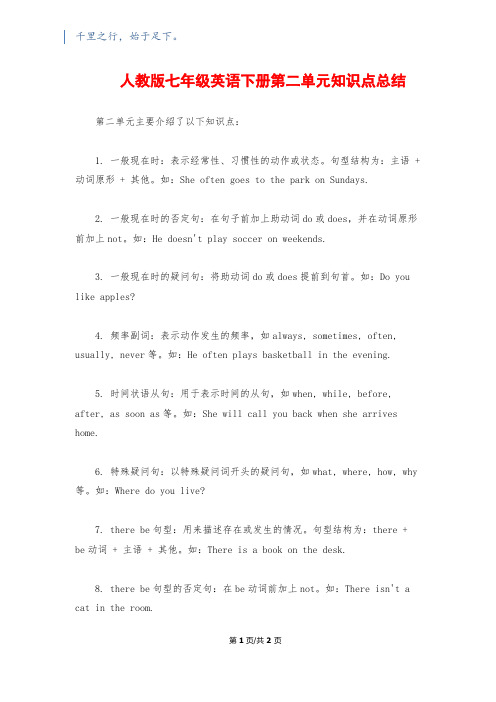
千里之行,始于足下。
人教版七年级英语下册第二单元知识点总结第二单元主要介绍了以下知识点:1. 一般现在时:表示经常性、习惯性的动作或状态。
句型结构为:主语 + 动词原形 + 其他。
如:She often goes to the park on Sundays.2. 一般现在时的否定句:在句子前加上助动词do或does,并在动词原形前加上not。
如:He doesn't play soccer on weekends.3. 一般现在时的疑问句:将助动词do或does提前到句首。
如:Do you like apples?4. 频率副词:表示动作发生的频率,如always, sometimes, often, usually, never等。
如:He often plays basketball in the evening.5. 时间状语从句:用于表示时间的从句,如when, while, before, after, as soon as等。
如:She will call you back when she arrives home.6. 特殊疑问句:以特殊疑问词开头的疑问句,如what, where, how, why 等。
如:Where do you live?7. there be句型:用来描述存在或发生的情况。
句型结构为:there + be动词 + 主语 + 其他。
如:There is a book on the desk.8. there be句型的否定句:在be动词前加上not。
如:There isn't a cat in the room.第1页/共2页锲而不舍,金石可镂。
9. there be句型的疑问句:将be动词提到句首。
如:Is there a park near your house?希望以上总结对您有所帮助!。
七年级英语下Unit2知识点归纳与复习人教新目标版
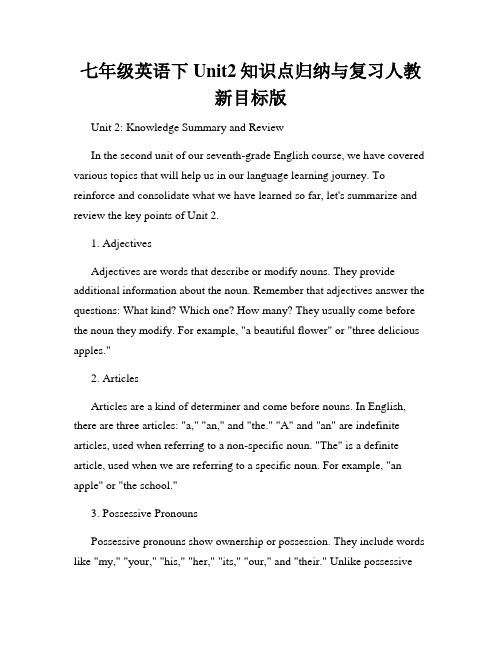
七年级英语下Unit2知识点归纳与复习人教新目标版Unit 2: Knowledge Summary and ReviewIn the second unit of our seventh-grade English course, we have covered various topics that will help us in our language learning journey. To reinforce and consolidate what we have learned so far, let's summarize and review the key points of Unit 2.1. AdjectivesAdjectives are words that describe or modify nouns. They provide additional information about the noun. Remember that adjectives answer the questions: What kind? Which one? How many? They usually come before the noun they modify. For example, "a beautiful flower" or "three delicious apples."2. ArticlesArticles are a kind of determiner and come before nouns. In English, there are three articles: "a," "an," and "the." "A" and "an" are indefinite articles, used when referring to a non-specific noun. "The" is a definite article, used when we are referring to a specific noun. For example, "an apple" or "the school."3. Possessive PronounsPossessive pronouns show ownership or possession. They include words like "my," "your," "his," "her," "its," "our," and "their." Unlike possessiveadjectives, possessive pronouns do not require a noun after them. For example, "Is this pen yours?" or "The book is mine."4. Past Tense of Regular VerbsRegular verbs follow a specific pattern when conjugated in the past tense. We add "ed" to the base form of the verb. For example, "walked," "talked," or "played." However, there are some exceptions and irregular verbs that do not follow this pattern, like "go-went" or "come-came."5. Simple Present TenseThe simple present tense is used to talk about general truths, habits, routines, and scheduled events. It is formed by using the base form of the verb, except for the third-person singular where we add "s" or "es" to the verb. For example, "He plays tennis every Sunday" or "She never eats meat."6. Prepositions of TimePrepositions of time are used to show when an action or event takes place. Some common prepositions of time are "in," "on," and "at." "In" is used for longer periods of time, like months, years, or seasons. "On" is used for specific days or dates, and "at" is used for a specific time. For example, "I will visit my grandmother in July," "We have a math test on Monday," or "The movie starts at 7 p.m."7. Wh-QuestionsWh-questions are questions that begin with "wh-" words, such as "what," "where," "when," "who," "why," and "how." These questions are used togather information. For example, "Where is the library?" or "How do you get to school?"8. Comparative and Superlative AdjectivesComparative adjectives are used to compare two things, where superlative adjectives are used to compare three or more things. To form comparative adjectives, we add "-er" to short adjectives or use "more" before long adjectives. To form superlative adjectives, we add "-est" to short adjectives or use "the most" before long adjectives. For example, "She is taller than her sister" or "This is the most beautiful song I've ever heard."9. Present Continuous TenseThe present continuous tense is used to describe actions that are happening right now or around the present moment. It is formed by using the verb "to be" in the present tense and adding the present participle "-ing" to the base form of the verb. For example, "They are playing soccer" or "We are studying for the exam."Throughout Unit 2, we have explored these essential grammar points in English. By understanding and practicing these concepts, we can enhance our language skills and improve our overall proficiency. Remember to review regularly and apply these knowledge points in your everyday English communication. Keep up the good work, and soon you will become fluent English speakers!。
人教版七年级下册unit2知识点总结(K12教育文档)

人教版七年级下册unit2知识点总结(word版可编辑修改)编辑整理:尊敬的读者朋友们:这里是精品文档编辑中心,本文档内容是由我和我的同事精心编辑整理后发布的,发布之前我们对文中内容进行仔细校对,但是难免会有疏漏的地方,但是任然希望(人教版七年级下册unit2知识点总结(word版可编辑修改))的内容能够给您的工作和学习带来便利。
同时也真诚的希望收到您的建议和反馈,这将是我们进步的源泉,前进的动力。
本文可编辑可修改,如果觉得对您有帮助请收藏以便随时查阅,最后祝您生活愉快业绩进步,以下为人教版七年级下册unit2知识点总结(word版可编辑修改)的全部内容。
Unit 1 Can you play the guitar?Section A (1a-2d)1. play与棋类、球类等搭配时,不加the,如play basketball\ soccer\ chessplay与乐器搭配时,用play + the + 乐器,如play the guitar\play the violin。
2。
speak v。
说(某种语言);说话1)speak English/Chinese/French/Japanese2)speak to sb. 和某人说话 speak to me3。
want v。
想要 = would like1)want sth. 想要某物2)want to do sth。
想要做某事3)want sb。
to do sth。
想要某人做某事4。
join v。
参加;加入1)join:后面接表示团体或组织的名词,指加入某个团体或组织,并成为其中的一员2)join in:表参加某种活动,后面接表示活动的名词,相当于take part in练习:1)I want to ___the basketball club.2)Ann often ___our games.5. what about = how about +doing ……怎么样6. be good at = do well in +doing 擅长于……精通……Yao Ming is good at playing basketball. =Yao Ming does well in playing basketball.7. tell v。
Unit 2 单元知识点-人教版七年级英语下册

Unit 2知识点P71. get up 起床2. go to school 去上学3. get dressed穿衣服dress sb./oneself 给谁/自己穿衣服4. brush one’s teeth刷牙5.eat /have breakfast/luncn/dinner吃早饭/午饭/晚饭6. take/have a shower洗淋浴7.一What time do you usually take a shower ,Rick?里克,你通常几点洗澡?I usually take a shower at six forty。
我通常在6:40洗澡。
P8 2d8.have an interesting job有一份有趣的工作①work常指抽象意义的工作,泛指一切工作,侧重于量,是不可数名词, /动词②job可数名词,常指某项具体的工作,更侧重种类9.at a radio station 在广播电台10. from….to从….到11.at night在晚上12. in the morning/afternoon/evening在上午/下午/晚上13.That' s a funny time for breakfast!那个时间吃早饭真有意思呀!a funny time for sth./to do sth. 做某事的有趣的时间14.Exercise①动词,锻炼②不可数名词,意为“锻炼;运动”take exercise 锻炼=do exercise③可数名词,意为“习题;练习”/体操等do morning/eye exercises15.go to work去上班16. be late for school / work 上学/上班迟到17. on weekends(在)周末18.on school days 在上学日Section Bhalf past+基数词……点半 a quarter to+基数词差一刻到几点19. do one’s homework做家庭作业20. go to bed上床睡觉21. go home回家(home是副词,前不加to)22. take a walk = go for a walk 散步23.clean my/the room打扫房间P1124.go to bed early 早上床睡觉25.eat quickly吃得快26.play sports 参加体育运动2b27.I don’t have much time for breakfast,so I usually eat very quickly.我没有很多时间吃早饭,因此我通常吃得很快。
人教七年级下册英语unit2知识点总结
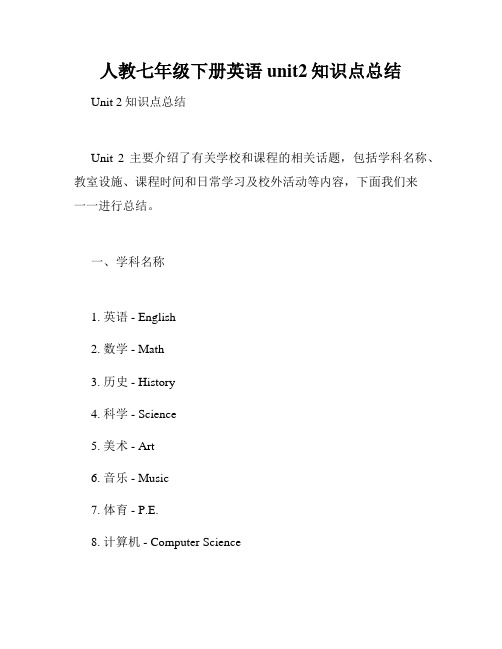
人教七年级下册英语unit2知识点总结Unit 2知识点总结Unit 2主要介绍了有关学校和课程的相关话题,包括学科名称、教室设施、课程时间和日常学习及校外活动等内容,下面我们来一一进行总结。
一、学科名称1. 英语 - English2. 数学 - Math3. 历史 - History4. 科学 - Science5. 美术 - Art6. 音乐 - Music7. 体育 - P.E.8. 计算机 - Computer Science二、教室设施1. 黑板 - blackboard2. 白板 - whiteboard3. 投影仪 - projector4. 音响 - sound system5. 地图 - map6. 水龙头 - tap7. 电视 - TV8. 电脑 - computer9. 灯 - light10. 窗户 - window三、课程时间1. 上午 - in the morning2. 下午 - in the afternoon3. 晚上 - in the evening4. 早上 - in the early morning5. 夜晚 - at night6. 每周 - every week7. 每天 - every day8. 周末 - on weekends四、日常学习1. 做作业 - do homework2. 练习 - practice3. 复习 - review4. 读书 - read books5. 写作 - write compositions6. 讨论 - have discussions7. 板书笔记 - take notes8. 教师讲解 - teacher's explanation9. 学习笔记 - study notes10. 做练习 - do exercises五、校外活动1. 课外活动 - extracurricular activities2. 运动会 - sports meeting3. 聚会 - party4. 社交活动 - social activities5. 英语角 - English corner6. 爱好小组 - hobby group7. 社团活动 - club activities8. 学校之旅 - school trip以上就是Unit 2的主要内容,希望能够帮助大家更好地学习英语,更好地了解学校和课程的相关话题。
七年级英语人教版下册Unit2重点知识点归纳
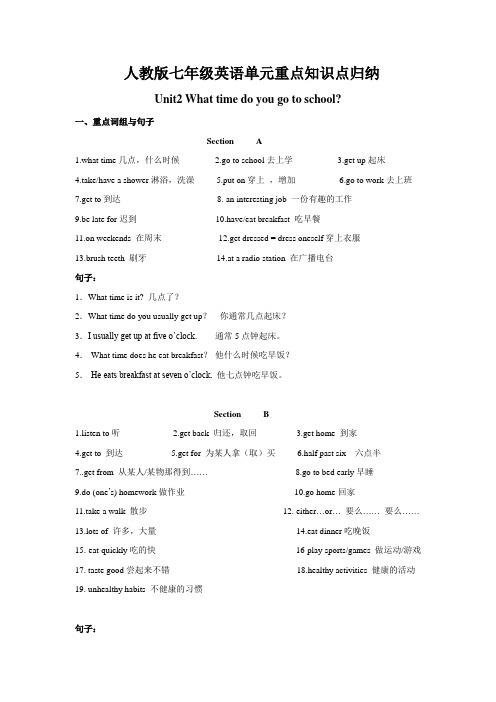
人教版七年级英语单元重点知识点归纳Unit2 What time do you go to school?一、重点词组与句子Section A1.what time几点,什么时候2.go to school去上学3.get up起床4.take/have a shower淋浴,洗澡5.put on穿上,增加6.go to work去上班7.get to到达8. an interesting job 一份有趣的工作9.be late for迟到10.have/eat breakfast 吃早餐11.on weekends 在周末12.get dressed = dress oneself穿上衣服13.brush teeth 刷牙14.at a radio station 在广播电台句子:1.What time is it? 几点了?2.What time do you usually get up?你通常几点起床?3.I usually get up at five o’clock. 通常5点钟起床。
4.-What time does he eat breakfast?他什么时候吃早饭?5.-He eats breakfast at seven o’clock. 他七点钟吃早饭。
Section B1.listen to听2.get back 归还,取回3.get home 到家4.get to 到达5.get for 为某人拿(取)买6.half past six 六点半7..get from 从某人/某物那得到……8.go to bed early早睡9.do (one’s) homework做作业10.go home回家11.take a walk 散步12. either…or…要么……要么……13.lots of 许多,大量14.eat dinner吃晚饭15. eat quickly吃的快16 play sports/games 做运动/游戏17. taste good尝起来不错18.healthy activities 健康的活动19. unhealthy habits 不健康的习惯句子:1.When do students usually eat dinner?学生们通常什么时候吃晚餐?2.I don’t have much time for breakfast.我没有许多时间吃早餐。
七年级下册人教版英语unit2知识点
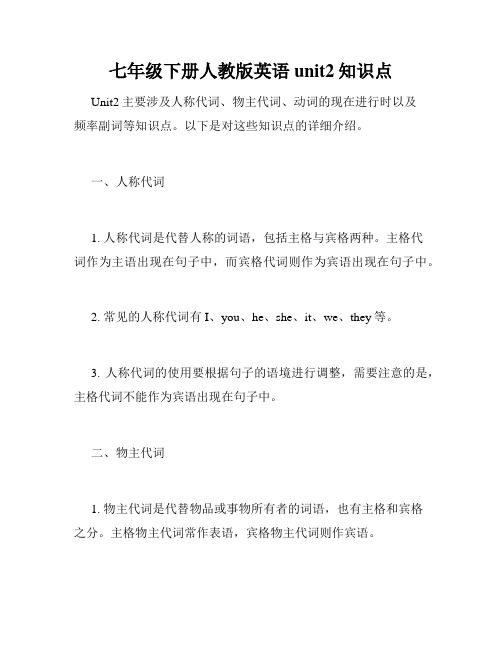
七年级下册人教版英语unit2知识点Unit2主要涉及人称代词、物主代词、动词的现在进行时以及频率副词等知识点。
以下是对这些知识点的详细介绍。
一、人称代词1. 人称代词是代替人称的词语,包括主格与宾格两种。
主格代词作为主语出现在句子中,而宾格代词则作为宾语出现在句子中。
2. 常见的人称代词有I、you、he、she、it、we、they等。
3. 人称代词的使用要根据句子的语境进行调整,需要注意的是,主格代词不能作为宾语出现在句子中。
二、物主代词1. 物主代词是代替物品或事物所有者的词语,也有主格和宾格之分。
主格物主代词常作表语,宾格物主代词则作宾语。
2. 常见的物主代词有my、your、his、her、its、our、their等。
3. 物主代词的使用也要根据句子的语境进行调整,要尽可能在句子中避免重复使用物主代词。
三、动词的现在进行时1. 现在进行时表示现在正在进行的动作,通常由“be + 现在分词”构成。
2. 现在分词的构成:一般情况下,在动词原形的基础上加ing。
但也有一些规则需要注意,如:以不发音的“e”结尾的动词,将“e”去掉再加ing。
以重读闭音节结尾,且末尾只有一个辅音字母的动词,双写末尾字母再加ing。
以“y”结尾的动词,将“y”变成“i”再加ing。
3. 现在进行时要注意的问题:一是不要过度使用现在进行时,二是要注意现在进行时和现在简单时的区别。
四、频率副词1. 频率副词用来描述动作发生的频率,表示有多少次,有多长时间一次或者几率有多大。
2. 常见的频率副词有always、usually、often、sometimes、seldom、hardly ever、never等。
3. 在句中,频率副词通常放在行为动词之前,be动词之后,如:I usually go to school by bike. He is always late for class.总的来说,Unit2涉及的知识点较为基础但重要,要牢记每一个知识点的用法,通过大量的练习来加深对这些知识的理解和掌握。
人教版七年级下册英语 Unit2 知识点总结复习课件 (共44张ppt)

a lot用作状语, 修饰动词、形容词或副词的比较级。例如: Ann is a lot taller than Lucy. 安比露西高很多。
①You give me
help. Thanks
.
A. a lot; lots of
B. lots of; a lot
C. a lot; a lot
D. lots of; lots of
—On Sunday.
【活学活用】
①他要么在家要么在学校。
He is
at home
at school.
②要么你错要么他错。
you
he
wrong.
③She doesn’t like Japanese. I don’t like it
.
A. too
B. also
C. as well
答案: ①either; or ②Either; or; is
1. What time do you usually get up, Rick? 里克, 你通常什么时候起床? 该句是what time引导的特殊疑问句。what time在此意为“几 点; 什么时候”, 对时间进行提问, 表示时间点, 提问几点、几 点几分等。其结构为What time+do/does+主语+动词原形+. . . ? 例如: What time do you go to school? 你几点去上学?
(3)我们通常在时刻前加介词at来表示“在几点”。例如: at half past six 在六点半
二、时间介词at, in, on
仔细观察例句, 翻译画线部分内容。
1. I usually go to bed at 9: 00 pm.
人教版七年级下册英语第二单元知识点整理

人教版七年级下册英语第二单元知识点梳理Unit 2 What time do you go to school?短语整理•get up 起床;站起•get dressed 穿上衣服•take a shower 洗淋浴•radio station 广播电台•on weekends (在)周末•do (one’s) homework 做作业•take a walk 散步;走一走•either … or … 要么……要么……;或者……或者……•lots of 大量;许多•brush one’s teeth刷某人的牙•eat / have breakfast 吃早餐•go to school 上学•go to bed 去睡觉•go to work 去上班•go home 回家•cl ean one’s room打扫某人的房间•play sports 做运动•in the morning 在早上•at noon 在中午•at night 在晚上•afternoon tea 下午茶•be late for ………迟到了•be good for … 对……有好处用法讲解•get up 起床;站起o起床:I usually get up early.o站起:I got up when the leader came in.•get dressed 穿上衣服o get + 过去分词e.g., the window got broken / the car got cleaned•take a shower 洗淋浴o take a bath 在浴缸里洗澡o take a walk 散步;走一走•do (one’s) homework 做作业o e.g., You need to do your homework.•either … or … 要么……要么……;或者……或者……o连接两个独立的词、短语或句子o e.g., Either Amy or Lily can read this book now. Amy和Lily中只有一个人现在能读这本书。
Unit2单元知识点总结人教版七年级英语下册
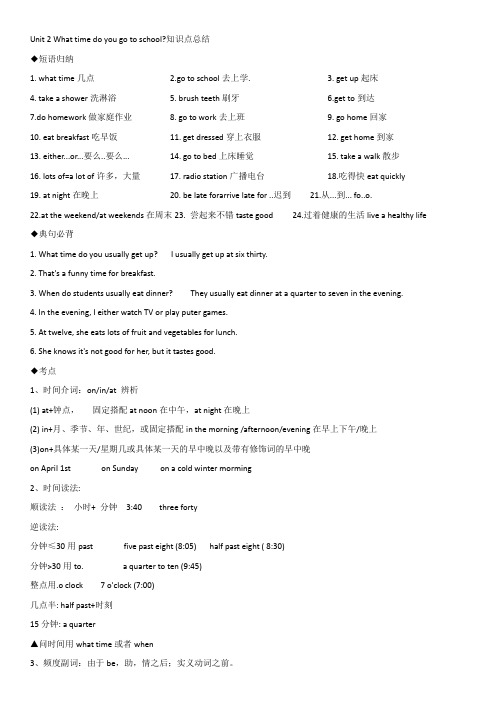
Unit 2 What time do you go to school?知识点总结◆短语归纳1. what time几点2.go to school去上学.3. get up起床4. take a shower洗淋浴5. brush teeth刷牙6.get to到达7.do homework做家庭作业8. go to work去上班9. go home回家10. eat breakfast吃早饭11. get dressed穿上衣服12. get home到家13. either...or...要么..要么... 14. go to bed上床睡觉15. take a walk散步16. lots of=a lot of许多,大量17. radio station广播电台18.吃得快eat quickly 19. at night在晚上20. be late forarrive late for ..迟到21.从...到... fo..o.22.at the weekend/at weekends在周末23. 尝起来不错taste good 24.过着健康的生活live a healthy life◆典句必背1. What time do you usually get up? I usually get up at six thirty.2. That's a funny time for breakfast.3. When do students usually eat dinner? They usually eat dinner at a quarter to seven in the evening.4. In the evening, I either watch TV or play puter games.5. At twelve, she eats lots of fruit and vegetables for lunch.6. She knows it's not good for her, but it tastes good.◆考点1、时间介词:on/in/at 辨析(1) at+钟点,固定搭配at noon在中午,at night在晚上(2) in+月、季节、年、世纪,或固定搭配in the morning /afternoon/evening在早上下午/晚上(3)on+具体某一天/星期几或具体某一天的早中晚以及带有修饰词的早中晚on April 1st on Sunday on a cold winter morming2、时间读法:顺读法:小时+ 分钟3:40 three forty逆读法:分钟≤30用past five past eight (8:05) half past eight ( 8:30)分钟>30用to. a quarter to ten (9:45)整点用.o clock 7 o'clock (7:00)几点半: half past+时刻15分钟: a quarter▲问时间用what time或者when3、频度副词:由于be,助,情之后;实义动词之前。
七年级下册英语人教版unit2知识点总结

七年级下册英语人教版unit2知识点总结本文主要总结七年级下册英语人教版unit2的知识点,包括词汇、语法、听力、口语等方面,帮助读者更好地学习英语知识。
一、词汇1. 动物:cat(猫)、dog(狗)、elephant(大象)、panda(熊猫)等。
2. 食物:hamburger(汉堡包)、pizza(披萨)、noodles(面条)、rice(米饭)等。
3. 水果:banana(香蕉)、apple(苹果)、orange(橙子)、grape(葡萄)等。
4. 颜色:red(红色)、blue(蓝色)、yellow(黄色)、green (绿色)等。
5. 数字:one(一)、two(二)、three(三)、four(四)等。
二、语法1. be动词的用法:am(我是)、is(他/她/它是)、are(你们/他们是)等。
2. 人称代词的用法:I(我)、you(你)、he(他)、she(她)等。
3. There be句型的用法:There is(有)和There are(有)等。
三、听力1. 听懂日常生活中的简单问话:例如Where are you from?(你来自哪里?)等。
2. 听懂简单的对话和故事:例如听一位老师介绍自己、一段学生旅行的故事等。
3. 提高听力技巧:注意听语言节奏、语调和重音,积累常见的听力短语,多听多练。
四、口语1. 用英语介绍自己:例如I am a student.(我是学生。
)等。
2. 用英语问候:例如Hello!(你好!), Good morning!(早上好!)等。
3. 表达喜好和习惯:例如I like swimming.(我喜欢游泳。
), I usually do homework after school.(我通常在放学后做作业。
)等。
以上是七年级下册英语人教版unit2的知识点总结,希望能对读者有所帮助,更好地掌握英语知识,提高英语水平。
(完整word)人教版七年级下册unit2知识点总结,推荐文档

Unit 1 Can you play the guitar?Section A (1a-2d)1. play与棋类、球类等搭配时,不加the,如play basketball\ soccer\ chess play与乐器搭配时,用play + the + 乐器,如play the guitar\play the violin。
2. speak v.说(某种语言);说话1)speak English/Chinese/French/Japanese2)speak to sb. 和某人说话speak to me3. want v.想要= would like1)want sth. 想要某物2)want to do sth. 想要做某事3)want sb. to do sth. 想要某人做某事4. join v.参加;加入1)join:后面接表示团体或组织的名词,指加入某个团体或组织,并成为其中的一员2)join in:表参加某种活动,后面接表示活动的名词,相当于take part in练习:1)I want to ___the basketball club.2)Ann often ___our games.5. what about = how about +doing……怎么样6. be good at = do well in +doing 擅长于……精通……Yao Ming is good at playing basketball. =Yao Ming does well in playing basketball.7. tell v.讲述;告诉1)tell sb. sth. =tell sth. to sb. 告诉某人某事2)tell sb. (not) to do sth.告诉某人(不)做某事3)tell sb. about sth. 告诉某人关于某事练习:(2015·衡阳中考)Our teacher tell us ___ on the street because it’s too dangerous (危险).A. not play soccerB. not to play soccerC. to not play soccer8. Sounds good.听起来不错9. art club 美术俱乐部swimming club 游泳俱乐部English club 英语俱乐部chess club 国际象棋俱乐部music club 音乐俱乐部story telling club 讲故事俱乐部sports club 体育俱乐部Grammar Focus1. show1)n.演出;节目school show学校演出;talk show脱口秀;on show展出2)v. 给……看;展示show sb. sth. = show sth. to sb. 向某人展示某物2. or conj. 或者;也不(用于否定句)Can you sing or dance? 你会唱歌或者跳舞吗?3. talk v.&n.说话;交谈1)talk to/ with 与某人谈话Alice is talking to/ with our English teacher.2)talk about 谈论某事Don’t talk about your English teacher.【辨析】talk, speak, tell, say4. 情态动词can的用法1)含义:情态动词can不能单独存在,必须与动词原形一起构成谓语,没有人称和数的变化。
人教版七年级英语下册第二单元知识点汇总

Unit 2 What time do you go to school??child?–?children?(pl.)?孩子tooth?–?teeth?(pl.)?牙齿go to work 上班(反义词go home)go to bed 睡觉(反义词get up)短语句子what?time?几点钟get up 起床get home到达家中go to class上课go to school 上学come?back?回来get dressde穿衣服brush teeth刷牙get/be dressed in+衣服名词或颜色名词表示穿着…衣服或…颜色的衣服be in+颜色(穿戴…颜色衣服/帽子) dress sb.给某人穿衣dress oneself某人自己穿衣服put on 穿上(反义词take off)do one’s homework 做家庭作业have?an?interesting?job?有一份有趣的工作talk about yourself谈论你自己work?at?the?radio?station?在电台工作your?radio?show?你的广播节目make breakfast做早饭eat?quickly?吃得快eat?vegetables?吃蔬菜eat?breakfast?=have breakfast/dinner/lunch 吃早、晚、午饭have?sth.?for?breakfast?/?lunch?/?dinner?早/?午?/?晚饭吃…..?take a shower = have a shower 洗淋浴澡(have a show演出)make a shower schedule 做一个洗澡的安排from…to …从……到……be?never?late?for?work?上班从来不迟到be late for school=go to school late上学迟到了six?thirty=half?past?six六点半 a quarter past three 三点一刻 a quarter to seven 六点四十五half an hour=a half hour 半小时around six o’clock 六点左右take a walk=have a walk=go for a walk 散步go?out?for?a?walk出去散步lots of= a lot of = much= many 大量,许多either…or…或者…或者good/well(好)→better较好→best最好sometimes= at times 有时tell sb. about sth. 告诉某人某事know about sth. 知道某方面的情况love to do =like to do 喜欢干某事watch the early morning news on TV 看电视早间新闻in the morning/ afternoon/evening在早上/下午/在晚上in the day在白天at night 在夜间on school nights在上学的晚上on school days在上学期间exercise?on?weekends?周末锻炼take?/?get?exercise?运动/?锻炼?do?morning?exercises?做早操visit?/?see?your?uncle?看望你的叔叔?do?eye?exercises?做眼保健操do?English?exercises?做英语练习?keep?healthy?/?be?healthy?/?stay?healthy?/?keep?in?good?health?保持健康?What?do?you?do???=What?are?you???=What’s?your?job???你是干什么的?get?up?early?起得很早a?quarter?past?three?in?the?afternoon?下午3?点15分?go?home?early?早点回家clean?up?the?room?打扫干净房间clean?the?room?打扫房间clean?my?room?打扫我的房间play?sports?做运动?do?your?homework?first?先做作业?listen to 听…?listen to the early morning news on radio 听电台早间新闻don’t?have?much?time?for?breakfast?没有很多时间吃早饭play?basketball?for?half?an?hour?打半个小时的篮球either?watch?TV?or?play?computer?games?要么看电视要么玩电脑游戏eat?a?good?breakfast?吃一顿丰盛的早餐eat?lots?of?fruit?and?vegetables?for?lunch?午饭吃许多水果和蔬菜be?good?for?your?health?对你的健康有好处taste?good味道很好have?a?very?healthy?life有一个健康的生活healthy?activities?健康的活动unhealthy?habits?不健康的习惯1.英语时间的表达(1)整点时间可表示为“钟点数+o’clock”或直接读钟点数,省去o’clock。
人教PEP七年级下册英语Unit 2 单元重点知识

Unit 2 单元重点知识原创不容易,为有更多动力,请【关注、关注、关注】,谢谢!灵师不挂怀,冒涉道转延。
——韩愈《送灵师》Section A单词up adv.向上dress v.穿衣服n.连衣裙brush v.刷;刷净n.刷子tooth n.(pl. teeth)牙齿shower n.& v.淋浴n.淋浴器(间)usually adv.通常地;一般地forty num.四十never adv.从不;绝不early adv.&adj.早(的)fifty num.五十job n.工作;职业work v.& n.工作station n.电(视)台;车站o'clock adv.(表示整点)……点钟night n.晚上;夜晚funny adj.奇怪的;滑稽好笑的exercise v.& n.锻炼;练习best adj.最好的adv.最好地;最group n.组;群wow(表示惊奇或敬佩)哇;呀短语get up起床;站起get dressed穿上衣服take a shower 洗淋浴radio station广播电台on weekends (在)周末at night 在晚上from…to…从……到……be late for……迟到句型1.—What time do you usually get up,Rick?里克,你通常几点起床?—I usually get up at six thirty.我通常六点半起床。
2.—When does Scott go to work? 斯科特什么时候上班?—He always goes to work at eleven o’clock. He’s never late. 他总是十—点上班。
他从不迟到。
3.That’s a funny time for breakfast!那个时间吃早饭真有意思!Section B单词half n.& pron.一半;半数past prep.晚于;过(时间) adj.过去的quarter n.一刻钟;四分之一homework n.家庭作业run v.跑;奔clean v.打扫;弄干净 adj.干净的walk n.& v.行走;步行quicly adv.很快地either conj.或者adv.也(用在否定词组后)lot pron.大量;许多sometimes adv.有时taste v.有……的味道;品尝n.味道;滋味life n.(pl.lives )生活;生命短语half past six 六点半a quarter to seven 七点差一刻do (one’s) homework做作业take a walk 散步;走一走either…or…要么……要么……;或者……或者……lots of 大量许多be good for 对……有益句型1.In the evening,I either watch TV or play computer games.在晚上,我要么看电视,要么玩电脑游戏。
- 1、下载文档前请自行甄别文档内容的完整性,平台不提供额外的编辑、内容补充、找答案等附加服务。
- 2、"仅部分预览"的文档,不可在线预览部分如存在完整性等问题,可反馈申请退款(可完整预览的文档不适用该条件!)。
- 3、如文档侵犯您的权益,请联系客服反馈,我们会尽快为您处理(人工客服工作时间:9:00-18:30)。
Βιβλιοθήκη 16. 到达:get to +地方 get here/ there/ home 到这/ 那/家 arrive in +大地方 I arrive in Beijing. arrive at +小地方 I arrive at the bank. reach +地方
17.go across 从物体表面横过 go across the street 横过马路 (从某物表面穿过) go through (从空间穿过) go through the forest 穿过 树林 18.on + 街道的名称。 Eg: on Center Street at + 具体门牌号+街道的名称 Eg: at 6 Center Street
11. take /have a walk 散步 12. the beginning of…… ……的开始,前端 at the beginning of…… 在……的开始,前端 in the beginning 起初,一开始 13. have fun doing=have a good time to do =enjoy (oneself)doing 玩得开心,过得愉快 我昨天玩得很开心。 14. have a good trip 旅途愉快 15. take a taxi 坐出租车 16. thank you/ thanks ----You are welcome. 谢谢---不客气
Unit 2 Where’s the post office?
一. Asking ways: (问路)
1. Where is (the nearest) ……? (最近的)……在 哪里? 2. Can you tell me the way to ……? 你能告诉我 去……的路吗? 3. How can I get to ……? 我怎样到达……呢? 4. Is there …… near here / in the neighborhood? 附近有……吗? 5. Which is the way to ……? 哪条是去……的路?
2.hope to do sth 希望做某事 I hope to pass this exam. 我希望通过这次考 试。 hope +从句 I hope tomorrow will be fine. 我 希望明天将会晴朗。 (从句即是一个小句子, 这个小句子又放在大句子中,从属于大句子, 所以叫从句。如tomorrow will be fine是一个从 句,它又放在I hope 的后面,形成句中有句。)
3. if 引导一个表示假设的句子。 If I have much money, I will go to the moon. 如果我有许多钱,我就会去月球。 If you are hungry, you can buy some food in the supermarket. 如果你饿了的话,你可以在 超市买一些食物。
4. busy ---It’s a very busy street.
Be busy with 忙于做某事 Eg. The students are busy with their homework. Be busy (in) doing 忙着做某事 Eg. His father is busy writing a letter.
三.重难点解析
1.enjoy doing sth 享受做某事的乐趣,喜爱 做某事 I enjoy reading. 我喜爱读书。 到目前为止,我们学了两个特殊的动词finish 和enjoy,都是要带 doing. I finish cleaning the room. 我扫完了这间屋子。
三.词组
1. be across from …… 在……的对面 across from the bank 在银行的对面 2. be next to…… 紧靠…… next to the supermarket 紧靠超市 3. between…and… 在…和…之间 between the park and the zoo 在公园和动物园之间 among 表示位于三 者或三者以上之间 4. in front of…与 in the front of In front of 在(整体、外部)…前面 There is a tree in front of the classroom. 课室前面有棵树。 in the front of… 在…(内)的前部 There is a desk in the front of the classroom. 课室内的前部有张桌子。
5. behind…… 在……后面 behind my house 在我家后面 6. turn left/ right 向左/右拐 on the left/right of…… 在某物的左/右边 on the left of our school 在我们学校的左边 on one’s left/right 在某人的左/右边 on my left 在我左边 7. go straight 一直走 8. down /along…… 沿着……(街道) down/along Center Street 沿着中央街 9. in the neighborhood=near here 在附近 10 welcome to…… 欢迎来到……
二.Showing the ways: (指路)
1. Go straight down / along this street. 沿着这条街一 直走。 2. Turn left at the second turning. 在第二个路口向左 转。 3. You will find it on your right. 你会在你右手边发现 它。 4. It is about one hundred metres from here. 离这里 大约一百米远。 5. You’d better take a bus. 你最好坐公交车去。 (You’d better+动词原形)
